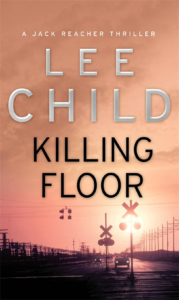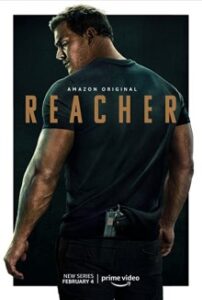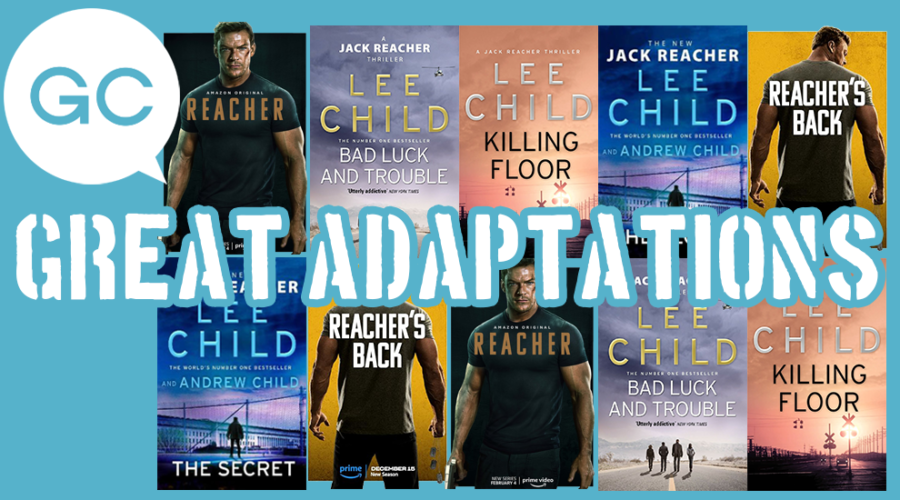This month’s theme at FBF has been the joy of reading trashy books. By trashy, I mean books that are written primarily for their entertainment value, not as literature.
Trashy books are great fun to read, often with great storytelling and propulsive plot and are usually written in a simple and accessible style, which makes them quick to read – the type of book that looks much easier to write than it actually is.
For our first Great Adaptation, we’re looking at the ultimate in trashy joy reads – the Jack Reacher books, by Lee Child, and the TV adaptation starring Alan Ritchson. We’ll quietly ignore the Tom Cruise movies with their rather puzzling casting.
If you’ve never read the Jack Reacher books, please go and lay hands on one as fast as you can – they are such great reads and you will also have the joy of having a long series ahead of you to get stuck into! It could be the perfect summer reading project.
So what’s it about?
Reacher is an ex-military policeman, winner of many medals and bringer of justice wherever he goes. He is also exceptionally large, at 6’5” and 250lbs, and deadly with it.
 We first meet him in the novel Killing Floor; now out of the army, Reacher has returned to the US and decided to explore the country he’s served all his life but has never actually lived in, having grown up on military bases around the world due to his father’s career in the Marines.
We first meet him in the novel Killing Floor; now out of the army, Reacher has returned to the US and decided to explore the country he’s served all his life but has never actually lived in, having grown up on military bases around the world due to his father’s career in the Marines.
Reacher carries nothing with him except a toothbrush. He travels by bus or hitchhiking, occasionally picking up work to supplement his army pension but mostly he just drifts around exploring.
Of course, he has an uncanny knack of finding himself in places where something sinister is happening – the kind of sinister that he’s just the right person to fix.
There’s a very Wild West sensibility to the books: Reacher walks into a town, sorts out the bad guys and promptly leaves again. And just like old fashioned Westerns, there’s something particularly American about him – perhaps the way he seems to embody the concept of freedom which is so much part of American DNA.
In Killing Floor, also the basis for the first series of the TV show, he travels to a small Georgia town called Margrave and is soon locked up for murder. Before long he’s working alongside the few non-corrupt cops in town to work out why people keep turning up dead. There are some wild twists and turns which might stretch credulity in any other thriller but somehow Child makes it all work.
The books are brilliant – real page turners. Reacher is a great hero; he’s strong, smart and has an unshakable moral compass. He’s also an amazing fighter and strategist so as the reader, while the plots have lots of tension, you can rest assured that no one can beat him. In this sense, reading a Reacher book is a bit like reading a romance novel – you know there’s a guaranteed happy ending on the way so even when all seems lost, you can just relax and enjoy the ride.
There’s no such thing as half measures or moral nuance in Reacher’s world.
One of the joys of the books is seeing him win again and again and cheering him on as he matter-of-factly kills all the bad guys, who are always very bad. There’s no such thing as half measures or moral nuance in Reacher’s world.
Much is made of Child’s use of short sentences in the Reacher novels but the writing style works perfectly for the type of book it is, and ties in neatly with Reacher’s character – straight-up, sharp and no-nonsense.
Child worked in TV before becoming an author and one of the pleasures of the Reacher novels is how cinematically clear they are. The fight sequences in particular are beautifully choreographed and easy to picture which I suspect is harder to do than it sounds; I can only think of one other author who writes fight scenes so well and that’s Bernard Cornwell, who writes mostly battle scenes rather than individual fights.
 The TV series is a brilliant adaptation of the book. Ritchson is great as Reacher – he plays the role with just the right knowing nod to Child’s sense of fun. It’s not quite tongue in cheek but you can see that when he’s delivering a one-liner he’s really enjoying it, and so are the rest of the cast.
The TV series is a brilliant adaptation of the book. Ritchson is great as Reacher – he plays the role with just the right knowing nod to Child’s sense of fun. It’s not quite tongue in cheek but you can see that when he’s delivering a one-liner he’s really enjoying it, and so are the rest of the cast.
I laughed out loud much more than I expected to, which is a real triumph of the TV series; I have never found the books particularly funny, perhaps because Child is so good at keeping the tension ratcheted up, but seeing the characters on screen allows for that bit of levity and makes you feel like you’re in on the joke.
The fight scenes are well done, with the prison bathroom fight a particular stand-out; for me that’s the scene that most closely matches the way the fighting is generally described in the books. The chemistry between the leads works really well, with Malcolm Goodwin as Finlay bringing a wry humour to the role, and Willa Fitzgerald as Roscoe making a perfect foil for Reacher’s brute strength.
Personally I prefer to read the books before watching the movie or TV series; I find it allows me to form my own pictures of the characters and settings which are then (in a good adaptation) expanded and complemented by the adaptation. I used to think that books were universally, without fail, better than any adaptation could do justice to, but I think that in the past decade or so adaptations have gotten so good that there’s often not much between them anymore, which can only be a good thing.
As far as Reacher is concerned, it doesn’t really matter where you begin: the books can be read in almost any order given that each is set in a different town (although I do like to read a series in order) but if you want to start with the TV series, you really can’t go wrong.
I’d love to know your thoughts on Reacher – have you read the books/watched the series? What’s your favourite thing about them if so, and what did you think of the adaptation? Feel free to let us know on social media.

